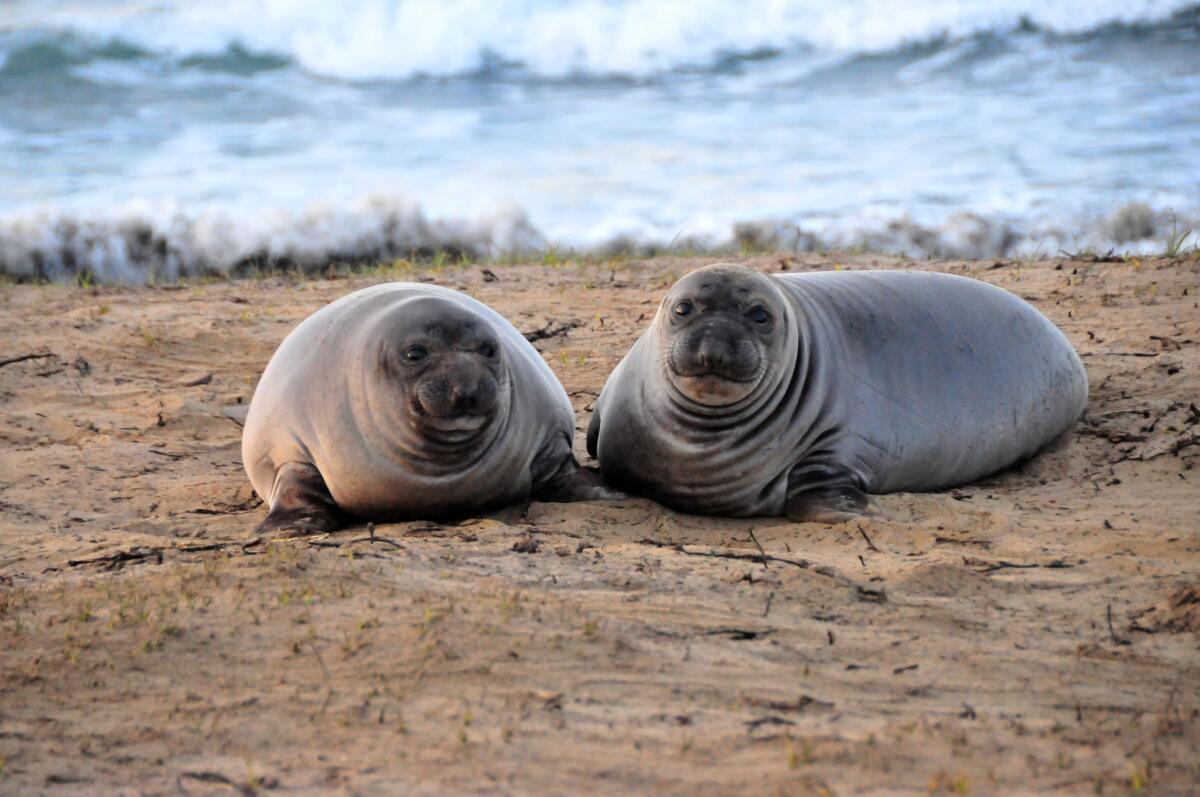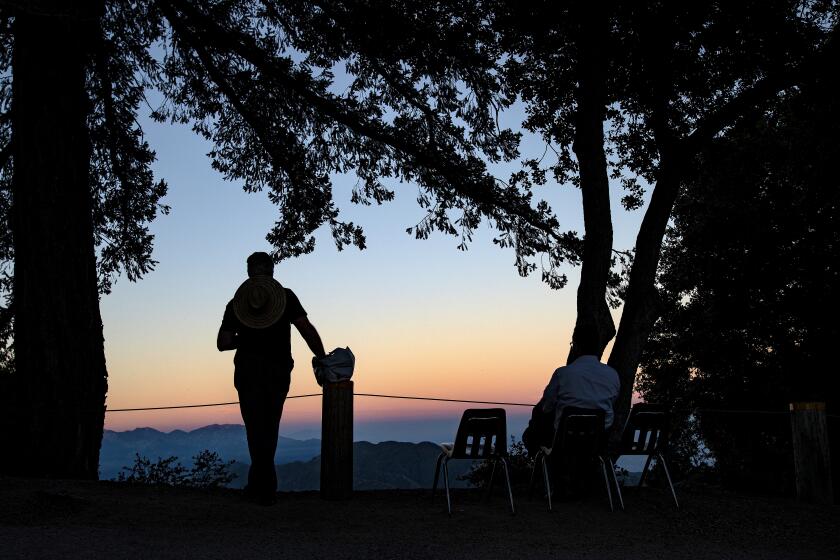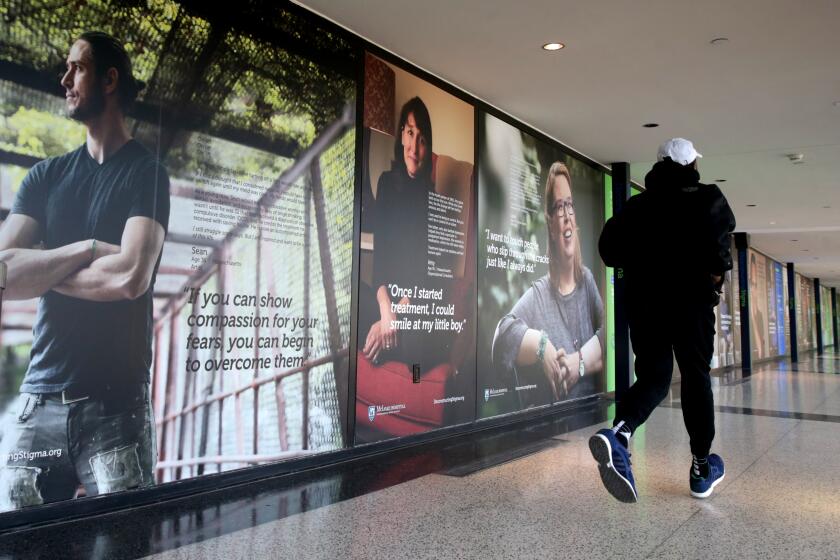Opinion: What elephant seals taught me about parenting my adult son with psychosis

- Share via
The ranger directed me to New Year’s Creek Beach for my shift as a docent naturalist at Año Nuevo, a state park in Northern California. It was winter of 2018 and an injured elephant seal had hauled in. He lay amid the driftwood littering the sand after the previous night’s storm. A patch of silvery-black skin on his back had been bitten clean away by a cookiecutter shark, leaving a deep pink wound that made me shudder.
I looked down at my phone. I had no bars. Nobody could reach me there. Año, as the rangers call it, is off the grid. This was partly why I went there, to reinvent myself, to learn a new language and, when there was a lull between visitors or I was posted on a remote part of the reserve, to cry freely about my boy, who has psychosis.
Right then, it was my job to ensure the park visitors gave the seal a wide berth and to pray that he survived — although I made that last part up because, while I am not religious, I didn’t want this marine mammal to die on my watch. The length of his proboscis allowed me to age him as a juvenile and the penile opening just below his umbilicus confirmed his sex. I knew this from my rigorous training, but what I hadn’t been trained to do was accept that I couldn’t save him.
More than a quarter of U.S. adults say they feel overwhelmed by stress. Here are a few ways to create positivity and tame the beast of chronic stress.
I sat on a log watching the seal’s chest rise and fall like the waves. He was too big to move, and I couldn’t control the tide that was going out, leaving him increasingly stranded as time stretched on.
I moved closer and talked to him, though I knew this was risky. He was the size of an SUV, and his wound made him unpredictable. He also could move faster in the sand than I could. Mostly I just needed to be present and do nothing other than sit with the animal and my own thoughts — which, as simple as it seemed, had been almost impossible since Zach was first diagnosed in Los Angeles in 2009 at age 19.
In those early days I tried to find the right drug, the right therapist, the right treatment program. I believed that — just like a Subway sandwich with the right fixings — I could make him better. But every time he went into the hospital, he seemed to come out a bit worse, and no matter how many different antipsychotic drugs he tried, the side effects were wretched.
After nine years of this, I agreed I wouldn’t try to dictate his treatment as much, and that I wouldn’t force him into the hospital anymore. I moved five hours north, leaving him with his girlfriend, and lived for two years by this land so rugged and wild with beauty. At times the extraordinary natural splendor felt almost too much to bear.
Sitting alone in this Serengeti of the sea with this lonely beast reminded me of the times I used to sit with my son because he feared his own thoughts. “What is going to happen to me?” he would ask. “You must know.”
I pretended that I did. “All good things,” I told him. Maybe I was pretending then too, to be a woman who was not solely concerned with trying to save her son, who was committed to having a life of her own.
Was this ever going to feel like the kind of existence I could accept, an experience I might be able to spin into gold from the dense threads of suffering I’ve witnessed? Was this what it took to find compassion?
Mental health conversations are stuck on flawed notions of ‘awareness.’
The gulls descended in synchrony with the sun and aggravated the elephant seal, flapping around him and squawking. I wanted to will the animal back into the water, but I knew that even in the deep, wide ocean, where he could move more easily, he would still be vulnerable to further attacks.
“Please be OK, fella,” I said, my voice competing with the sound of the waves.
The injured seal raised his head and his tail flopped down onto the sand. He did it again and again. And then he vocalized his signature call that gathered strength in the wind. He slithered toward the water and, as the sun lowered on the horizon, entered the surf.
I was not sure whether I would ever see him again, or whether he would join the harem on North Point to be less alone and have more reason to fight and mate. Like the elephant seal, I, too, wanted to be all instinct, less fearful. And, like him, I would have to leave the land one day and embrace the mystery of what lies beyond, to push off and say goodbye. I knew my son had to forge his way without me. It is what I, and so many other parents of vulnerable adults, must live with, live through and stop resisting.
As I left the beach, I turned back to look at the seal’s dark shape in the water and I thought about how he was as big and as cumbersome and as mysterious as my son’s altered state. I wondered how an elephant seal could teach me so much more than a textbook or a class, maybe even everything I needed to know.
Tanya Frank is a writer living in London. Her new book is “Zig Zag Boy: A Memoir of Madness and Motherhood.” @TanFrankUK
More to Read
A cure for the common opinion
Get thought-provoking perspectives with our weekly newsletter.
You may occasionally receive promotional content from the Los Angeles Times.












